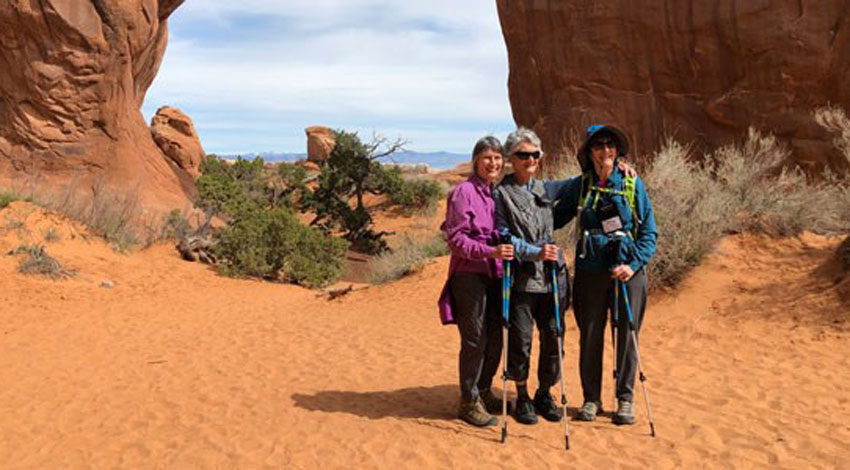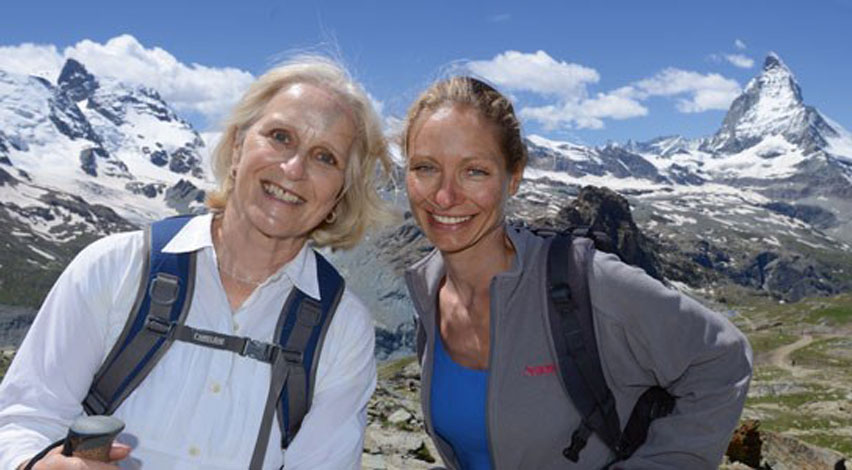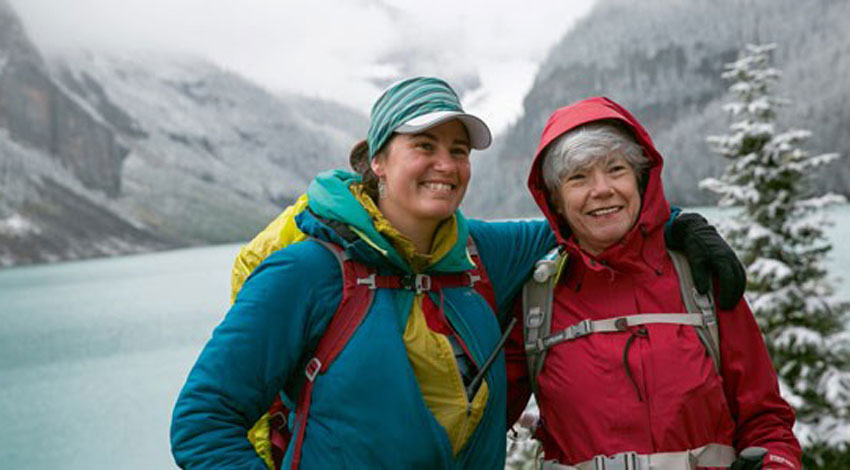Hiking Tips for Women Who Hike (and Beginners, Too!)
Lori Oliver-Tierney was 50 when she decided to hike the John Muir Trail. She didn’t have much backpacking experience, but she was excited when she hit the trails!
It didn’t take long for her to realize she was unprepared for the journey ahead of her.
Lori recounts her life-changing journey in her new book “Trudge: A Midlife Crisis on the John Muir Trail.” We sat down with Lori to interview her about everything she wished she’d known before her epic hiking trip, and we used her women’s hiking advice to put together this ultimate list of hiking tips for women. Whether you’re already a woman who hikes or if you’re just starting out — Lori has lots of lessons to share!

Hiking, Companion, Groups or Solo?
Choose your hiking partners or hiking group wisely.
“Be careful who you hike with — it can make or break your hiking trip. I was asked by a friend of mine to hike the John Muir Trail. It was always something I wanted to do — a dream I had — so I said yes. But I wasn’t prepared.
"She was a very fit woman, a park service ranger, and I was an overweight grade school teacher with asthma. Our philosophies and pace were very different. I almost quit the trail. She wanted me to quit. But that just made me want to hike it even more! I visited with some people who I met along the way, and they told me I shouldn’t stop my dream. So I hiked by myself during the day, and we met up in the evenings.”
Be open to meeting people on the trails.
“Hiking can be a very solitary endeavor, but on popular hiking routes like the John Muir Trail, there are always others out there. The days I hiked alone, I met incredible people. Put yourself out there and be willing to meet people on your journey! I knew the trail was going to be about the beauty of the wilderness, but the people I met along the way really shined. Without the 'trail angels' I met on the trail, I never would have made it. I was a solo hiker, but I didn’t hike it alone.”
If you’re afraid to hike solo … don’t.
“I don’t tell somebody to hike alone if they’re too afraid because there are some things out there that are difficult. If you really don’t want to go hiking alone, don’t. But don’t let being a solo female hiker hold you back from hiking either! Look for a partner or for an open-minded women’s hiking group near you.”
How to find women who hike.
“By far some of my most wonderful experiences I’ve had on the trails are when I’m hiking with just women. My husband doesn’t really like hiking, but I enjoy embarking on adventures without my husband. I have a friend named Nann who I do day hikes with to Yosemite. It’s just different with women hiking. We sing, we encourage each other, we share food and hiking tips for women. There’s nothing better than being out on the trail with other women who are enjoying it as much as you are (unless you want to be hiking alone).”
Find a women’s hiking group online.
“I’m part of a Facebook group called “Ladies of the John Muir Trail,” but there are so many women’s Facebook groups out there full of ladies just ready to support each other! Anybody can join these women’s groups, and they’re wonderful! The women of the JMT have carried me. They share wonderful information, like getting permits and leaving no trace, and we all encourage each other.”
Bask in your alone time.
“I loved meeting people on the trails, but the times when I was hiking alone were some of my favorite times. For a lot of women hiking, that’s why they do it; they want that solitude. There’s a deep place inside yourself that you can only find when you accomplish things on your own. Inside each of us, we have the strength to do things that we didn’t believe we could do.”

Training Tips for a Long Hiking Trip
Walk or hike almost every day.
“I did train a little for my John Muir hike — mostly walking — but I wish I had trained more. I recommend walking or hiking four to five days a week, at least two to five miles. You don’t need to kill yourself training, but it’s certainly good to hike and to really get your breath going.”
Check out our training tips for senior travel.
Train with your pack.
“I also recommend walking with your pack on and adding weight to it little by little. You want to get it to the weight it will be when you’re backpacking so you’re used to that weight on your back.”
Make friends with your footwear before you go.
“I think I have tried every hiking boot. My biggest tip: Do not buy new hiking boots right before a big trip! Leave time to break them in. You’ll pay for it dearly if you don’t.
"Lots of hikers also just wear trail runners. That’s what I wear now. They don’t take much time to break in, if at all, but they don’t have as much ankle stability as a boot. It’s really a personal preference. Know what works for you.
"Whichever hiking footwear you choose, train with them and your socks before you go. And pack some 2nd Skin and moleskin just in case.”
Investigate and research.
“Read books! There are too many out there to name, but you can ask women in your online hiking groups. My book isn’t a guide, it’s more of a memoir about feelings, about being a woman and about what I saw out there on the trail. But it can still help prepare you for the mental and emotional aspects of your journey.”

Tips for Older Women Hiking
You’re (probably) not too old to hike.
“It was always my dream to hike the John Muir Trail, but sometimes we lose pieces of ourselves when we’re busy raising children and working. Hiking is a great hobby for women to do when we’re older and our kids are grown. We are living longer today than generations before us. We don’t all look like J-Lo, and that’s OK. But most of us can do a lot of things we think that we can’t. In the women’s Facebook groups I belong to, I see 70- and 80-year-old women going out on these trails alone. There are older women hiking out there every day, many of them just starting even later in life. It’s a new time of our life at 50! I encourage older women curious about hiking to do it!”
Believe in yourself.
“Just because you’re older, doesn’t mean you’re worse. It just means you’re older. Just because you haven’t done something before, doesn’t mean you can’t. You will garner enormous things from this journey — a sense of peace, spirituality (if that’s what you’re looking for) and a connection to nature. It will be worth it.”
Find a personal motivation.
“While I was training for the hiking trip, a friend of mine was battling cancer. I often went right from the gym to drink margaritas with her. She really wanted to do the hike but couldn’t, so I told her I’d do the trip for her. Knowing I was doing it for her was often that extra motivation I needed to keep going.”
Hike your own hike.
“Not everybody has to hike the John Muir Trail in its entirety. You can section-hike it. It takes some people 5-10 years to hike the whole thing! My philosophy is to ‘hike your own hike and dream your own dream.’ But I do recommend hiking for at least a week to really experience the wilderness.”
Join a planned hiking trip.
“If you’re worried about hiking alone and having trouble finding women’s hiking groups near you — try signing up for a group hiking trip for seniors. Road Scholar offers both co-ed hiking programs for seniors and women-only hiking trips. Your leader will give you hiking tips and also teach you about the flora, fauna and geological features you see along the way!”
90% of any trail is in your head.
“The most important thing that you bring with you to the trail is your attitude. Based on my technical skills, I shouldn’t have made it. I didn’t have the most money or expertise, but I had the right attitude. And that’s what got me to my goal.”
You don’t have to do an epic hiking trip. Just walk.
“Backpacking — doing a big trail like the John Muir — is not cheap. But day hikes and walking — we all have access to that! And it’s one of the best forms of exercise for seniors. People quit gyms, but most people who walk and find that they enjoy it — they keep at it. Men, women, people of all ages should walk. It’s good for your heart and it fills your soul.”

Health Tips for Older Hikers
Prepare yourself for the parts of your body that don’t work as well as they used to.
“Some people who are older are fitter because they have the time to get into and stay in shape. But being an older hiker can also have its obstacles. Your body is older, and you need to take care of it. One of my biggest tips is using hiking poles. Hiking poles take the weight off your knees, and no matter what weight you are, everybody wants to save their knees and back. I also used knee braces. Bringing good food on the trail is also important, and make sure you hydrate.”
Bring ample medications.
“Don’t assume that when you go out on the trail that your body is going to adjust immediately. I didn’t want to waste extra space in my pack on medication, but when I got constipated on the trail, I was sure glad I did.”
Tips for avoiding altitude sickness on hikes.
“If are prone to altitude sickness at all, bring some things for it. There are natural things you can take, like ginger candy. And if you’re going at high altitude, arrive a couple of days before to acclimate. Some people who I met were in the best shape but didn’t make it because they got altitude sickness.”

More Packing Tips for Women Hikers
Pack light, but don’t leave necessities behind.
“In the last 15 years, it’s become a big trend to do light-gear camping. I encourage people to do that as much as they can, but not at the expense of their comfort. Don’t leave something out that could really come in handy. Some necessities in my book are:
- A water filter! A water filter is an absolute “must” for me.
- And you need hiking poles.
- I had never carried a water bladder before, but for long distance, the water bladder saved me. I could stay hydrated without taking my pack off.
- Mosquito repellent! If you’re not going to carry mosquito repellent, carry a net hat.
- Sunscreen and a hat.
- A pee rag to leave the wilderness as it is.
- A bear canister. You have to have one in most places now to protect your food.
- Medicines. Whatever you need in your regular life, you’re going to need out there in some form.
- A lightweight, long-sleeved shirt is really important. Even if it’s the middle of summer and you don’t think you’ll need it.”
Best food tips for hiking trips.
- Oatmeal is lightweight but filling.
- Gorp and granola are also a few favorites.
- Having some chocolate is wonderful; it’s a real pick-me-up.
- Emergen-C powder and/or electrolyte packets that you put in water are essential. I can’t tell you how many passes those got me over!
- Dehydrated foods also cut down on the weight.
- I got so sick of power bars, but they do help.
- A stove (I love being able to have some hot meals).
Bring your phone, but don’t rely on it too much.
“There are a lot of hiking apps out there that can be helpful on the trails, but I really liked the fact that I didn’t have to use my phone. And some people really love their phones for pictures, but I had a little snap camera. I also prefer to use real maps. I like to see where I am and what it looks like. I do bring my phone with me now, though, in case of emergency, and I have an anchor power cord which keeps your power a lot longer. I’m not particularly good with a compass. I’d suggest people take a class on that if you’d like to use one.”
Meet Lori Oliver-Tierney and hear more about her journey on The Ladies of Yosemite: A National Park Adventure Just for Women in May 2021!
Or Join us on a Women’s-Only Hiking Trip to find your own women’s hiking group.
About the Author
Lori Oliver-Tierney grew up in Utah and attended Long State University, receiving a degree in Recreation/Parks and Recreation Therapy. In 2004, at the age of 50, Lori took on a monumental challenge when she hiked the John Muir Trail, a journey she recounts in her memoir “TRUDGE: A Mid-Life Crisis on the John Muir Trail.” Lori had a successful teaching career for 26 years, has been married for 40 years and has two grown sons. She is also a grandmother. Lori lives in Mariposa, Calif.

